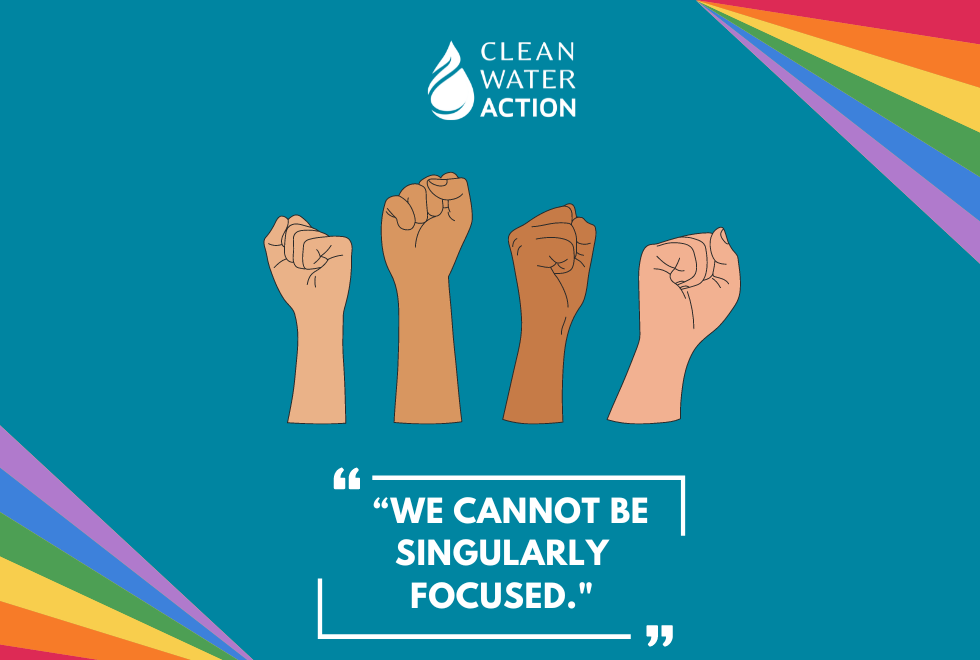
Clean Water Action is devoted to fostering a safe, inclusive environment for everyone involved, including the LGBTQ+ community. During Pride Month, and every day on, it is essential to acknowledge how the LGBTQ+ community has been involved in the fight for environmental justice. Environmental issues disproportionately impact those who are already vulnerable, and this includes the LGBTQ+ community.
Bethany Dickerson (she/her), the Regional Finance and Development Program Manager of Clean Water Action in Massachusetts interviewed Pat Gozemba and Karen Kahn, two LGBTQ+ activists for environmental justice, racial justice, and LGBTQ+ rights.
Pat Gozemba is co-chair of Salem Alliance for the Environment (SAFE), an organization advocating for a just and equitable transition to green energy, and a Clean Water Action partner and friend. She is a long-term activist in many different movements of the 60s and 70s, including the Civil Rights Movement, the Women’s Liberation Movement, and LGBTQ+ and environmental movements. In 1978, along with others, Gozemba formed the North Shore Gay Alliance. She was also one of the founding members of the Boston Area Lesbian and Gay History Project.
Karen Kahn is a long-time feminist, activist, and academic. She has over 30 years of experience in nonprofit communications and journalism. Together, Kahn and Gozemba wrote “Courting Equality: A Documentary History of America’s First Legal Same-Sex Marriages.”
Pat Gozemba started her journey fighting for LGBTQ+ rights in 1969 when she came out after previously being married to a man. She came out publicly at Salem State University, where she was a professor, in 1975, hoping to foster a safe environment for students to know that they were not alone. Though she faced backlash and derogatory comments from students and staff alike, that did not stop her in her efforts to fight for LGBTQ+ rights and salary equity as SSU.
Karen came out during the 80s. She felt she came out in a supportive environment, as there was a very strong lesbian feminist movement during the time.
Golden Era and Intersectionality
Was there ever a Golden Era for the LGBTQ+ community? Pat and Karen feel as though the 80s and 90s were romanticized as an era where “we were triumphing in struggle and community connection.” Still, the LGBTQ+ community was not yet considered full citizens. While we have made progress since that time, Karen notes, “that sense of security is now being offended in a lot of different places in this country.”
We still need to fight every day for LGBTQ+ rights and recognize the intersectionality in the issues we face as a collective. Pat stated, “We cannot be singularly focused. We have to look at all of the issues that are around us, including race, class, and gender.”
Just by reading their bios, it is obvious that Pat Gozemba and Karen Kahn have been involved in a multitude of community efforts to achieve justice in all senses. These issues are intersectional, and for Pat and Karen, environmental and public health advocacy work was essentially parallel with the work they were doing on LGBTQ+ issues. The first environmental movement Pat was involved in was the Clamshell Alliance, an anti-nuclear organization founded in 1976 to oppose the Seabrook nuclear power plant. She later saw that news publications like The Guardian were trying to get LGBTQ+ folks involved in the movement against the nuke. As we have stated before, LGBTQ+ communities are disproportionately impacted by environmental issues— highlighting and including LGBTQ+ folks in the movement is therefore essential.
SAFE
Salem Alliance for the Environment was founded by Pat and Karen in 2001. The two were inspired by a talk that was sponsored by Clean Water Action about the coal plant in Salem, about half a mile from their house. A few weeks later, 9/11 happened, which prompted Karen and Pat to really do something about the battles being fought over fossil fuels. SAFE was formed then and is going twenty years strong. SAFE is engaged in lots of local community outreach, and Karen and Pat take pride in their connection to groups like Clean Water Action and New England for Offshore Wind. When it comes to particular environmental issues, Karen and Pat emphasize just how dire it is to listen to the people most impacted, and closest to the site of injustice— that is what SAFE does, and what SAFE was borne out of. SAFE allows members to focus locally on things we can do to make our own communities more sustainable.
The same could be said for LGBTQ+ movements. In 1980, Pat co-founded The History Project Documenting LGBTQ+ Boston, an organization that archives LGBTQ+ history during a time when LGBTQ+ stories were not being told in mainstream media and archives. Such an organization allows LGBTQ+ individuals to gather and share their stories at the source, similar to environmental organizations like SAFE which unite communities on the same issue. Pat and Karen also shouted out the North Shore Gay Lesbian Alliance and NAGLY, local organizations— “It’s much harder to come out in your local organization than it is to march in New York or DC or even Boston.”
That is why having these grassroots organizations and tight-knit community resources is so valuable for all of us, regardless of race, age, gender, sexuality, or location. Our issues are intricately linked, and finding a safe space in one community can allow us to combat injustice in another. Pat and Karen find hope for the future in this intersectionality. They find hope in the people they work with every day— especially young people who are emerging as strong voices— and local organizations. As numerously stated by Pat and Karen, we must approach issues not with a singular lens, but with intersectionality in mind. We must emphasize community work and collaboration in order to address our issues which are so intricately linked. Join us in our fight at Clean Water Action to generate environmental justice for all!


